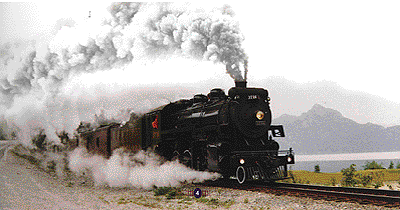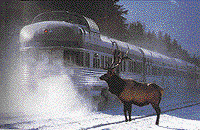|

Rub shoulders
with history in beautiful British
Columbia!
Travel ancient
trading routes used by aboriginal peoples in one of
the oldest continuously occupied regions of the
world. Follow the river valleys, as did the first
European explorers that arrived about 200 years ago
on their way to the shores of the Pacific. Sail the
coastal waters of BC where once hundreds of ancient
village sites were home to First Nations people and
their thousands of years of culture.
>From Jasper
and along the grand Fraser River, our historic
route crosses Yellowhead Pass in the Rockies and
leads west across the province to Prince George,
located at the confluence of the Nechako and Fraser
Rivers. Here, thousands of years ago, the Carrier
Indians realized that the abundance of wildlife
supported nomadic inhabitance and made it an ideal
place to settle down. Pioneer roots date back to
the fur trade, with the establishment of a
fur-trading post at nearby Fort
Fraser.
Travelling
westward, the picturesque, Swiss-like Bulkley
Valley leads to Hazelton, founded in 1866 by the
Hudson's Bay Company as a trading post. From
Hazelton to the sea, the distance is 180 miles with
an 800 foot drop in elevation, making the river,
the mighty Skeena, very swift, with turbulent
rapids, canyons and sharp bends and by 1913 the
transport of supplies to Hazelton had the
assistance of the Grand Trunk Pacific Railway,
which later became the Canadian National Railway.
Through the
majestic Coast Mountains, following the impressive
Skeena, the "River of Mists," to the rain forests
of the Pacific Coast and Prince Rupert, the route
follows a historic trail traditionally used by
settlers, gold-seekers, fur-traders, explorers,
aboriginal people and the Royal Canadian Mounted
Police. A trip along the river takes travellers
past remains of steamships, a gold rush town and
the remains of the once prosperous fish canneries
that used to operate here. At Prince Rupert, where
the Skeena empties into the Pacific Ocean and the
railway terminates, First Nations people, the
Tsimshian Nation, have been residents for over
10,000 years. This region was once one of the most
densely populated areas north of
Mexico.
The Inside
Passage, stretching from Prince Rupert to Port
Hardy on Vancouver Island, was home to the First
Nations people who established permanent villages,
due to the plentiful food supply. Their cultures
were distinguished by an emphasis on wealth, a
developed artistic tradition and a rich spirit
life. In the late 18th century, explorers from
Russia, Britain, France, and Spain converged on the
Pacific coastline looking for trade possibilities.
After an international tussle, the British gained
control of what would later become the coast of
British Columbia. Colonization and settlement began
in the 19th century.
To understand
the depth of this historic journey, there is no
better way to see and enjoy it all than to travel
by train. John Steel Rail Tours' Rocky Mountain
Coastal Circle offers this possibility as it
crosses BC aboard two of VIA Rail's trains; the
Canadian between Vancouver and Jasper, Alberta and
the Skeena from the Rockies to the BC coast. From
Prince Rupert cruise along the Inside Passage to
Port Hardy, on Vancouver Island and travel through
the island to Victoria, BC's charming capital city.
To find out more please visit the John Steel
website at www.johnsteel.com or call our friendly
Tour Coordinators at 1-800-988-5778, email,
info@johnsteel.com.
Contact:
John Steel Rail
Tours
Karen Davy,
Vice President
Phone:
800-988-5778
E-mail:
karen@johnsteel.com
Historical
Flashback
r
e..
 .. ..
In
British Columbia, Rail Travel is 'On A Roll
From
Transport Canada
Rail
travel in BC has gone through an extensive change
over the last decade. Some services have been
curtailed completely; others have been revived,
restructured or privatized, and some are struggling
to maintain their position in the market. There has
been a marked shift in where people are traveling
and the nature of their travel. Increasingly,
operators are concentrating their efforts on the
rail tour and rail excursion markets rather than
the transportation market. The new direction in
rail travel is apparent from changes that have been
introduced in the last ten
years.
In 1999, Rocky Mountaineer
Railtours carried 70,000 passengers on its scenic
rail tours from Vancouver to Jasper, Banff and
Calgary. That's an increase of almost 30 per cent
over the 534,000 passengers they carried in 1998.
This year, they expect a 15 percent jump. Amtrak
Pacific Northwest ridership has more than doubled
in the past five years.
The Pacific Northwest Rail
Corridor extends 750 km from Eugene, Ore. To
Vancouver, BC. Amtrak estimates the service diverts
more than 31 million miles of traffic from regional
highways and prevents more than 700 tons of air
pollution in the Pacific Northwest. The Seattle to
Vancouver service carried 85,000 passengers in
1999.
Information
on this page from Transport Canada Newsletter and
report. Fotomation features the Royal Canadian
Pacific Excursion Train, from Calgary, Alberta
through the Kicking Horse Pass to Golden, south to
Cranbrook and return via the Crowsnest Pass and
Lethbridge.
Track
Trends. Short lines
and mergers are the two latest trends in the
railway business. As for short lines, BC. now has
four rail companies hauling freight on short runs -
the Kelowna Pacific Railway, the Okanagan Valley
Railway, Rail America/E&N Railway and the
Southern Railway of BC. On the passenger side, four
excursion railways (short run) now operate in BC -
The Okanagan Valley Wine Train, the White Pass and
Yukon Route, the Royal Hudson Steam Train and the
Pacific Wilderness Railway. YVR
Rapid Transit Link.
Transport Canada's recently completed study on Rail
Access to Vancouver Airport recommends all levels
of government work to promote separate right-of-way
rail transit service in the Richmond - Vancouver
corridor, with a connection to the Vancouver
Airport. The study found if commuter and airport
transit co-operation with the Vancouver
International Airport Authority to determine the
requirements for a rapid transit link between
downtown Vancouver and the airport. For more
information contact: George Tyszewics, Senior
Policy Advisor, (604) 666-0480.
Amtrak
brought back its Mount Baker Service, which
runs daily across the border between Vancouver and
Seattle. White Pass and Yukon Rail serves cruise
ships with a 3-hour land excursion out of Skagway
into the Yukon. BC Rail introduced a successful
dinner train service, as well as a service to
Whistler in conjunction with a motor coach trip,
opening up new markets in these areas.
Changes in
British Columbia's Rail Passenger System
•
BC Rail Introduced a dinner train.
• Added a train from Whistler, mainly for
motor coach tour passengers.
• Experienced no growth on its long-standing
services. Pacific Starlight
•
Whistler
Explorer
• Cariboo Prospector & Royal Hudson
• VIA Rail Cut its transcontinental services
from 14/week to 3/week.
• Privatized the Rocky Mountaineer.
• Converted its northern service to a daylight
train.
• Maintained basic service on Vancouver
Island.
The
Canadian - The Skeena- The Malahat
•
The Great Canadian Railtour Co. built a Rocky
Mountain rail excursion market. The Rocky
Mountaineer
• Amtrak reinstated Vancouver-Seattle service.
The Mount Baker International
• White Pass reinstated passenger service to
cater to Alaska cruise ship passengers. White Pass
& Yukon excursions. There has been modest
overall growth over the last ten years as total
rail passenger trips increased by about 10 percent.
However, this is the net result of extensive
restructuring in services rather than growth in
existing services. In 1989, VIA Rail carried
335,000 passengers on the BC portion of its
transcontinental routes. Volumes dropped sharply as
a result of system restructuring, to the point
where VIA carried about 67,000 passengers on the BC
section of its transcontinental service in 1996, 20
percent of the 1989 volume.
Traffic
volume on other VIA Rail services and BC Rail's
long-standing services remained essentially
unchanged over the last ten years. The White Pass
and Yukon accounted for most of the growth that has
occurred. Without their contribution, volume fell
by 25 percent over the last decade. More railway
features straight ahead. on another track. Click to
continue.
Question:
What about a
return to Historic Street Cars as a year-round
tourist attraction and revenue generator? See our
new series Streetcars
& Street
Scenes. It
makes street sense.
Letters
to the Editor
|